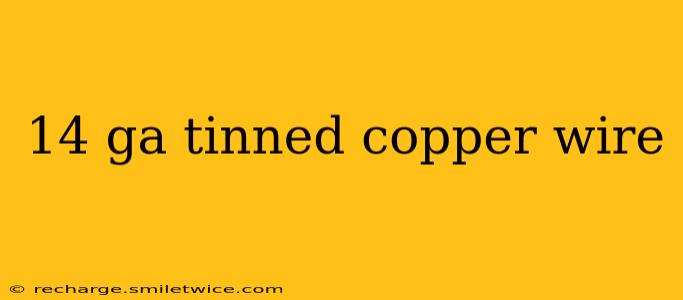14 gauge tinned copper wire is a common type of electrical wire used in a variety of applications. Understanding its properties, uses, and limitations is crucial for both professionals and DIY enthusiasts. This guide will delve into the specifics of 14 gauge tinned copper wire, answering common questions and providing valuable insights.
What is 14 Gauge Tinned Copper Wire?
14 gauge tinned copper wire is a conductor made of copper strands coated with a thin layer of tin. The gauge (AWG - American Wire Gauge) refers to the diameter of the wire; the lower the gauge number, the thicker the wire. A 14 gauge wire is relatively thick, capable of carrying a significant amount of current compared to thinner gauges. The tin coating provides several key advantages, including corrosion resistance and improved solderability. This makes it ideal for applications where the wire might be exposed to moisture or where reliable solder joints are essential.
What are the Uses of 14 Gauge Tinned Copper Wire?
The versatility of 14 gauge tinned copper wire makes it suitable for numerous applications, including:
- Household Wiring: While often used for less demanding circuits, it's sometimes employed in residential wiring, especially for branch circuits powering lights or outlets. However, larger appliances might require thicker gauge wire.
- Automotive Wiring: Its corrosion resistance makes it appropriate for automotive applications, though heavier-gauge wire is more common for high-current components.
- Electronics: In certain electronics projects, 14 gauge tinned copper wire can be useful for power connections where smaller gauge wires might not be sufficient.
- Hobbyist Projects: From model building to more substantial DIY electrical projects, 14 gauge tinned copper wire provides a reliable and relatively easy-to-work-with option.
What is the Ampacity of 14 Gauge Tinned Copper Wire?
The ampacity, or current-carrying capacity, of 14 gauge tinned copper wire depends heavily on factors like insulation type, ambient temperature, and installation method. Consult the National Electrical Code (NEC) or relevant building codes for precise ampacity ratings in your specific situation. Generally, 15 amps is often cited as a safe operating limit, but remember that this is a guideline and not an absolute value. Always prioritize safety and adhere to relevant regulations.
Is 14 Gauge Tinned Copper Wire Suitable for Outdoor Use?
While 14 gauge tinned copper wire offers some corrosion resistance due to its tin coating, it's not always ideal for direct outdoor exposure, especially in harsh environments. Direct burial or prolonged exposure to moisture might compromise the wire's integrity over time. For outdoor applications, consider using wire specifically designed for outdoor use, which usually features additional weatherproofing measures.
How Does 14 Gauge Tinned Copper Wire Compare to Other Gauges?
Compared to larger gauge wires (e.g., 12 gauge or 10 gauge), 14 gauge wire has a smaller diameter and lower current-carrying capacity. Smaller gauge wires (e.g., 16 gauge or 18 gauge) are thinner and have an even lower ampacity, making them unsuitable for applications demanding higher currents. The choice of gauge depends entirely on the specific requirements of the project or application.
What are the Advantages of Using Tinned Copper Wire?
The tin coating on copper wire offers several key benefits:
- Corrosion Resistance: Tin protects the copper from oxidation and corrosion, enhancing the wire's longevity, especially in humid or corrosive environments.
- Improved Solderability: The tin layer creates a more reliable solder joint, ensuring a strong and consistent connection. This is crucial for applications where reliable connections are paramount.
- Increased Durability: The tin coating adds a layer of protection against physical damage, contributing to the overall durability of the wire.
This comprehensive guide provides a solid foundation for understanding 14 gauge tinned copper wire. Remember always to prioritize safety and consult relevant codes and regulations before undertaking any electrical work. If you are unsure about any aspect of working with this wire, consult a qualified electrician.
